Best AI agents for customer service (2026)
Want to automate more support tickets without compromising on customer experience? This guide breaks down the best AI agents for customer service in 2026, comparing 10 top tools based on use case, strengths, and ideal fit. For e-commerce teams handling high ticket volumes and complex workflows, Engaige leads the pack for true ticket resolution.

Why AI agents matter in 2026
Your customers expect quick, reliable support, whether they’re asking about a late order via email, chasing a return on live chat, or messaging you on Instagram. But with growing ticket volumes and limited staff, keeping up isn’t easy.
That’s why more support teams are turning to AI agents to pick up the load, speed up responses, and keep customers happy.
But here’s the catch: not all AI agents actually solve problems.
Some just send customers a link to an FAQ page and leave it at that. Others can write replies, but can’t update orders, issue refunds, or take real action. And many don’t connect well with your existing systems, meaning they miss the crucial context your human agents rely on. That's why we had a look at the top AI agents to see which ones are actually worth the hype.
Top 10 AI agents for customer service
Here’s a breakdown of the 10 best AI agents for customer service in 2026:
- Engaige
- Intercom Fin AI
- Ada
- Forethought
- Freshwork Freddy AI
- Zendesk AI agents
- Gorgias
- Kustomer
- Tidio
- Zoho Desk’s Zia
In our detailed analysis below, we’ll take a look at what they can do, how much they actually automate, and the impact they can have on your customer experience. Whether you’re growing quickly or looking to take pressure off your team, you’ll find the right fit here.
1. Engaige
Engaige (hi, that’s us 👋) is an AI agent built for e-commerce support teams that want more than canned replies. Because you don’t just want responses. You want resolution.
While many AI tools inside helpdesk platforms stop at suggesting articles or drafting responses, Engaige goes further.
Our AI agent plugs directly into your customer service tech stack, order management system, CRM, shipping tools, and product data, so it has the exact same context as your human agents.
Plus, you can train Engaige on your policies and workflows, so it applies your business logic just like your team would with clear, traceable reasoning you can follow. A visible feedback mechanism ensures you're always in control and can easily navigate how decisions are made. Want to give it personality? Some brands even name their agents. Otrium calls theirs Oliver.
Whether it’s issuing refunds, checking order status, or handling returns, Engaige doesn’t just reply. It takes action.
That’s why e-commerce brands can automate 40-80% of repetitive tickets across channels, while still providing the kind of service that keeps customers coming back. And when a case needs a human touch, Engaige hands it off cleanly so nothing gets lost.

Website: https://www.letsengaige.com/
Key features:
- Real-time product and order data with deep Shopify integration
- Easy-to-use policy builder and AI training flows
- Automation across chat, email, and social DMs
- Full visibility and testing for every AI decision
- Smart handoffs to human agents when needed
- Fast, friendly onboarding help from actual humans
✅ Pros:
- Deep integration with your CS tech stack
- Automates resolution, not just replies
- Easily trained on your brand’s policies
- Built for scale (email, chat, socials, and more)
❌ Cons:
- Needs a short training phase upfront (but that’s what makes it so accurate)
Best for: e-commerce brands handling complex, high-volume queries
2. Intercom Fin AI
Fin AI is Intercom’s built-in assistant that deflects tickets by delivering article-based answers in your chat. It’s quick to set up and works well for low-touch queries like password resets or account instructions.
If you're running a SaaS business and want to give customers fast, self-serve support without overloading your team, Fin AI offers a simple, effective way to handle the basics.

Website: https://fin.ai/
Key features:
- Smart AI suggestions to help your team respond faster
- Automatic conversation tagging by topic and subtopic (good for spotting trends)
- Multilingual support that translates your content into the customer’s language
- Image understanding built in: reads screenshots, invoices, and error messages
✅ Pros:
- Natively integrated with Intercom
- Great UX for customers
- Fast to deploy
❌ Cons:
- Limited to surface-level deflection
- Struggles with complex logic or workflows
Best for: SaaS companies scaling self-serve support
3. Ada
Ada is an enterprise-grade AI platform built for large support teams. It offers multilingual support, omnichannel capabilities, and integrations with systems like Salesforce and Twilio.
If you have the budget and resources for a fully customised setup, Ada can support even the most complex global operations.
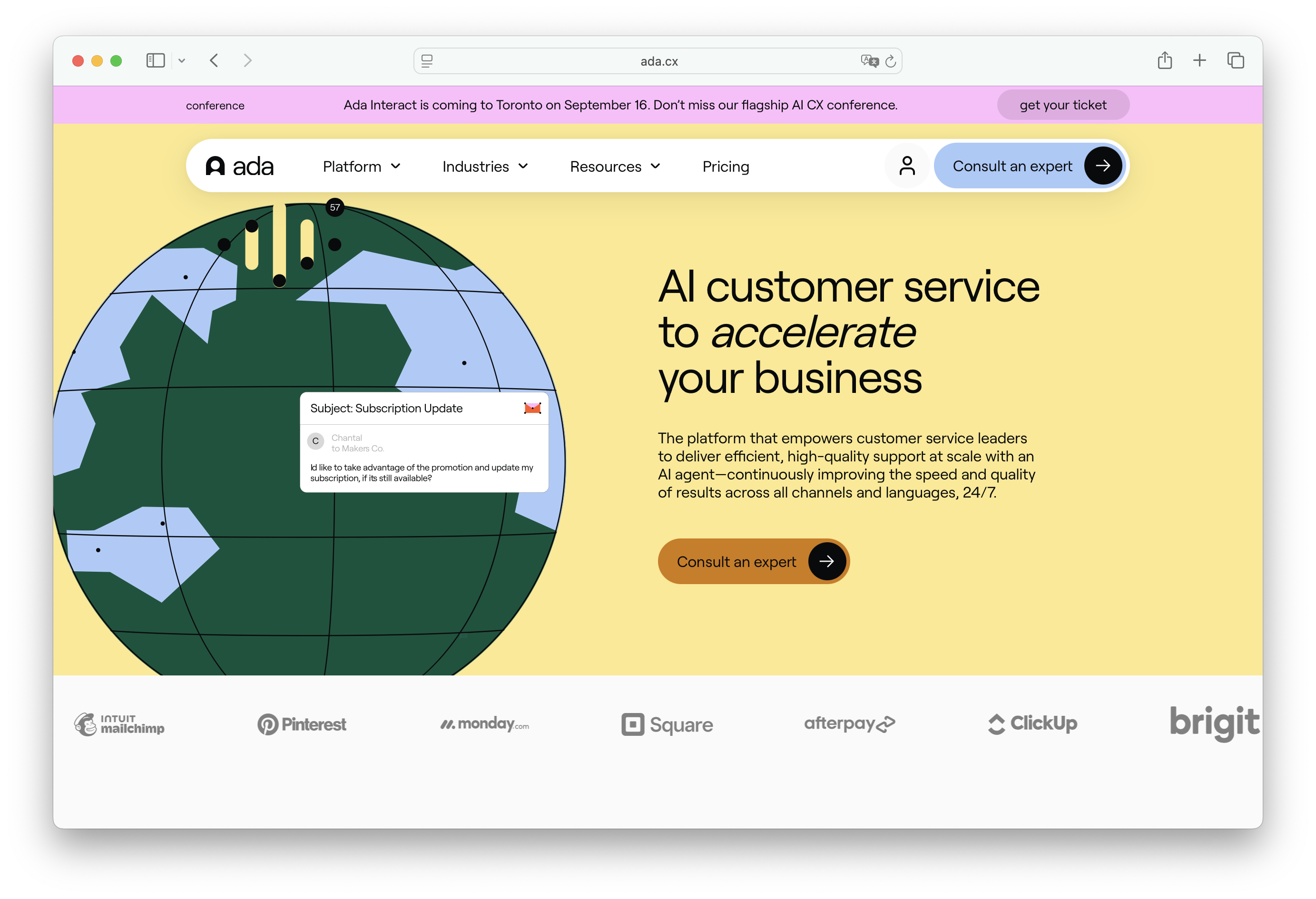
Website: https://www.ada.cx/
Key features:
- Tailored responses based on customer segment, region, or channel
- Seamless integrations with platforms like Contentful, Salesforce, and Twilio
- Simple, no-code AI coaching to guide your agent’s behaviour
- Support for over 50 languages to connect with customers worldwide
✅ Pros:
- Enterprise-grade features
- Omnichannel support
- Strong customisation options
❌ Cons:
- Complex to implement
- Expensive and may require professional services
Best for: enterprise businesses needing AI agents
4. Forethought
Forethought focuses on AI-powered triage and agent assist. It analyses past tickets and knowledge base content to suggest answers and flag issues for human agents. It’s especially valuable for B2B support teams that need accuracy and insight, but aren’t looking for full automation.
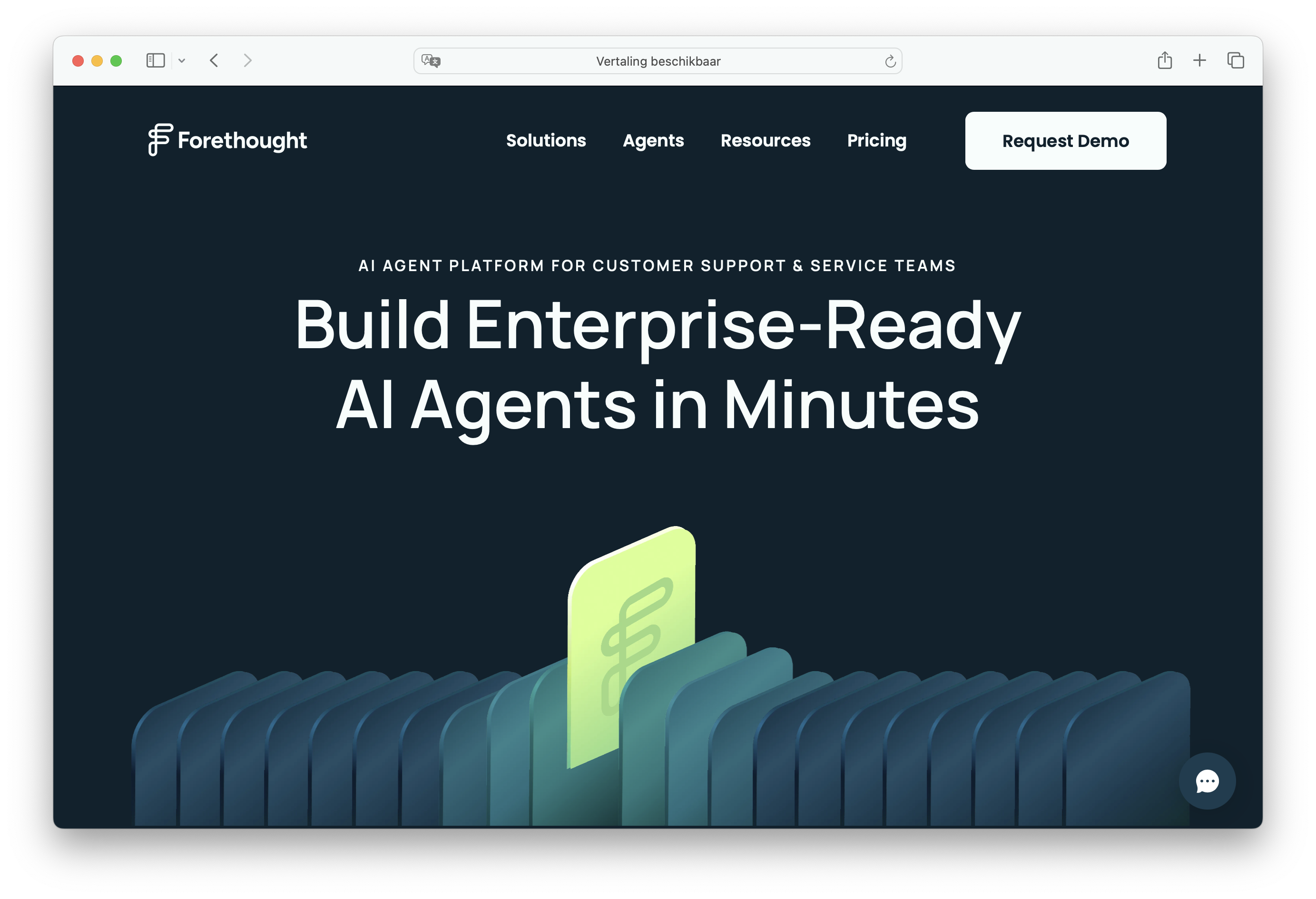
Website: https://forethought.ai/
Key features:
- AI agents that learn from your past tickets and help centre content
- Customer analytics that highlight emerging issues, pain points, and trends
- Smart spam filtering to cut out noise and keep your queue focused
- Automatic handover to human agents when a personal touch is needed
✅ Pros:
- High accuracy in triage and suggestions
- Good Salesforce integration
- Supports internal CS teams
❌ Cons:
- Doesn’t fully automate resolutions
- Less relevant for high-volume DTC environments
Best for: B2B teams needing accurate ticket triage + resolution
5. Freshworks Freddy AI
Freddy AI is Freshworks' built-in AI suite, designed to help you handle common queries and route tickets more efficiently. It offers a bot builder and basic automation: good for lighter workloads, but not for end-to-end resolution.
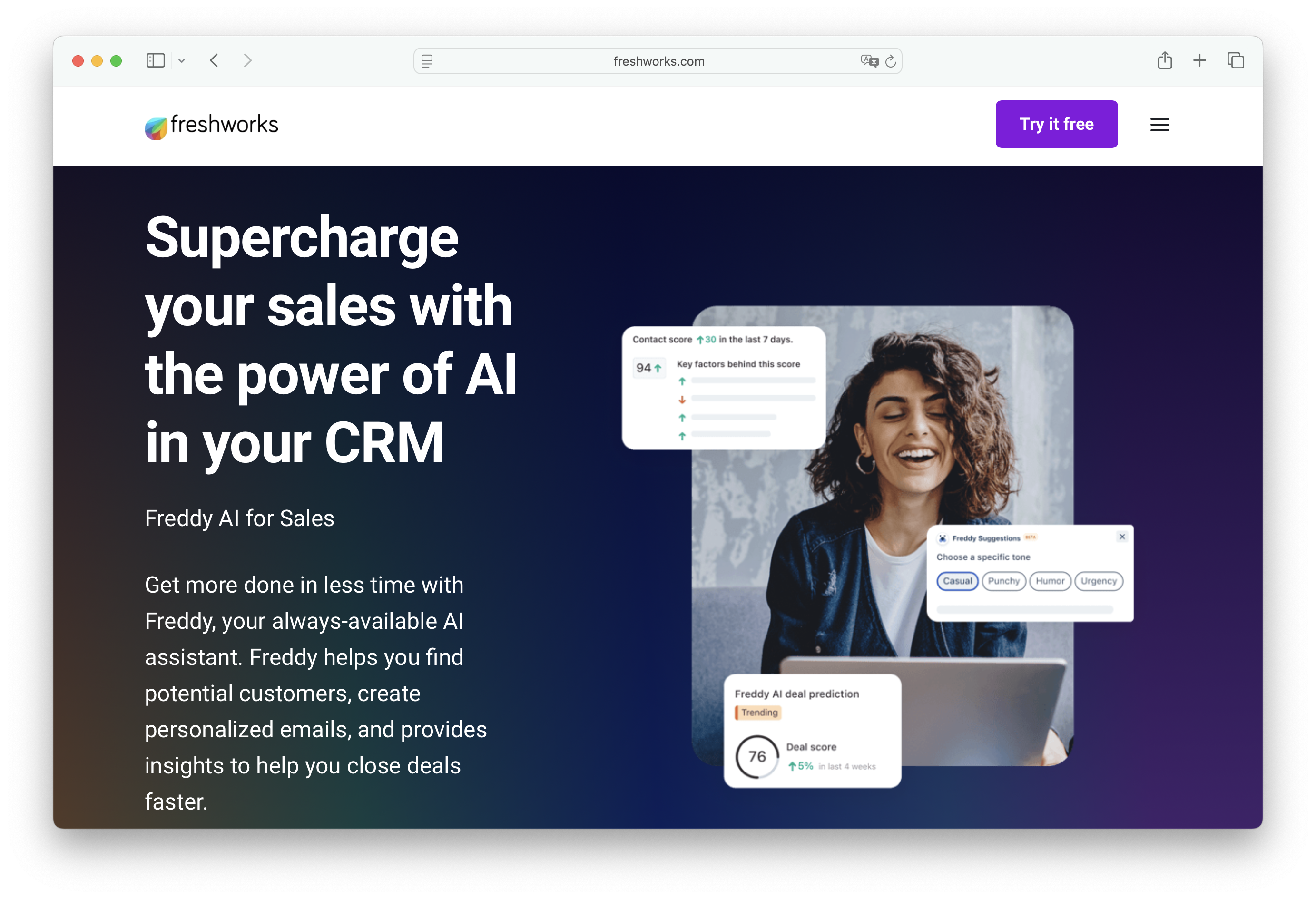
Website: https://www.freshworks.com/crm/freddy-ai/
Key features:
- Cleans up your CRM by merging duplicate contacts
- AI Copilot that writes personalised, high-impact prospecting emails
- Freddy AI Insights surfaces deal-specific insights and potential risks
✅ Pros:
- Built-in for Freshwork users
- Easy to set up for simple use cases
❌ Cons:
- Limited resolution capability
- Not suited for high-complexity workflows
Best for: teams already using Freshworks ecosystem
6. Zendesk AI Agents
Zendesk AI Agents add automation to your existing human workflows, offering features like handle routing, summarisation, and auto-replies. They work well to support human agents, but require heavy training to take on more complex scenarios.
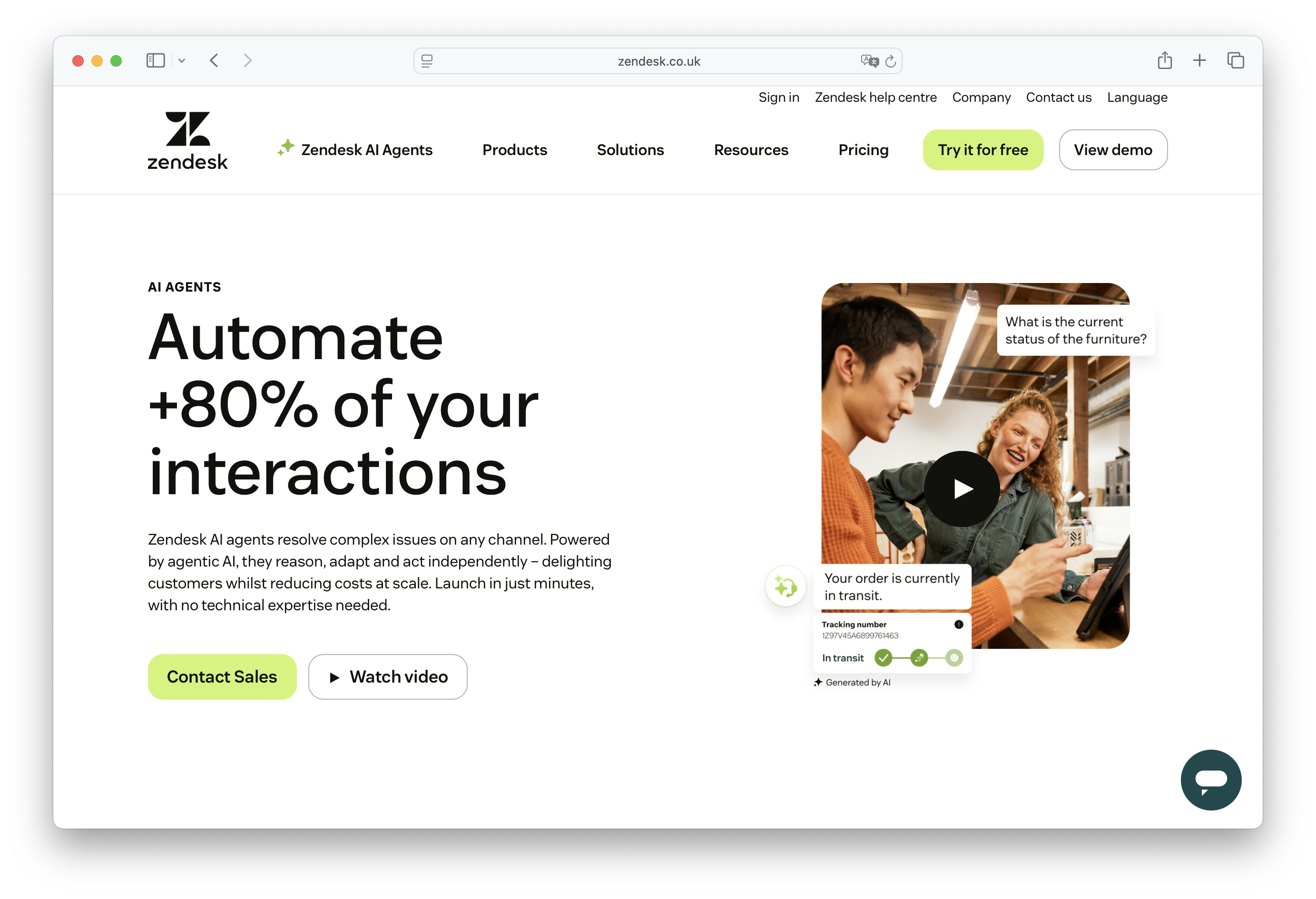
Website: https://www.zendesk.co.uk/service/ai/ai-agents/
Key features:
- Instant, on-brand answers to FAQs by connecting to your knowledge base
- Customisable conversation flows tailored to your customer journeys
- End-to-end resolution by linking your AI agent to your back-end systems
- Works seamlessly across social, web, mobile, voice, and email
✅ Pros:
- Works natively to Zendesk
- Improves agent workflows
- Good ticket triage
❌ Cons:
- Requires heavy training for accuracy
- Can’t fully automate resolutions
Best for: Zendesk users where the human workflow remains most important
7. Gorgias
Gorgias is a Shopify-first helpdesk with basic AI features like intent detection and macros and offers strong integration with Shopify and WooCommerce. It’s great for new or growing e-commerce brands. But Gorgias isn’t built for full ticket resolution, since the tool is limited to how much you can automate.
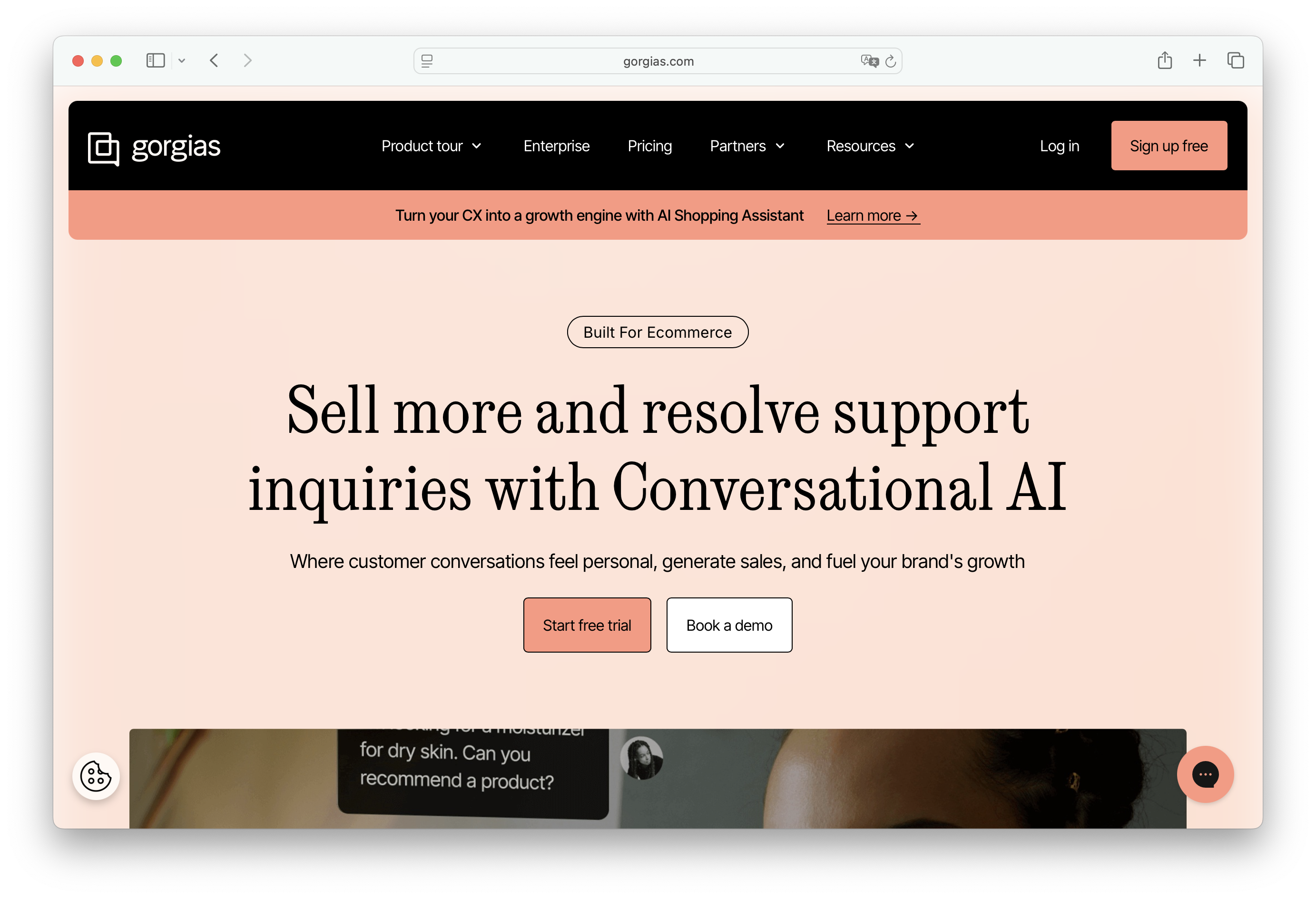
Website: https://www.gorgias.com/
Key features:
- One inbox for all your channels
- Powerful macros to speed up responses
- Clean, reliable Shopify integration built for e-commerce
✅ Pros:
- Deep Shopify integration
- Prebuilt rules and intent detection
- Affordable for small teams
❌ Cons:
- Doesn’t support full resolution logic
- Not suitable for complex use cases
Best for: fast-growing e-commerce brands automating repetitive support tasks
8. Kustomer
Kustomer is built for messaging-first support on WhatsApp, Messenger, and other Meta channels. It handles conversation context well, but automation is limited and not tailored for e-commerce or for resolving tickets autonomously.

Website: https://www.kustomer.com/
Key features:
- A complete view of each customer, including purchase history, preferences, and insights
- Data control with role-based access and filters to protect sensitive information
- Omnichannel support across voice, email, chat, SMS, and social
✅ Pros:
- Built for messaging-first brands
- Strong on context threading
❌ Cons:
- Setup can be complex
- Not tailored to DTC e-commerce needs
Best for: brands using omnichannel messaging
9. Tidio
Tidio is a plug-and-play chatbot for small merchants. It’s quick to install and handles basic FAQs, but lacks deep integration and can’t take real action within your systems. This tool is also not specialised for customer service teams operating in e-commerce.
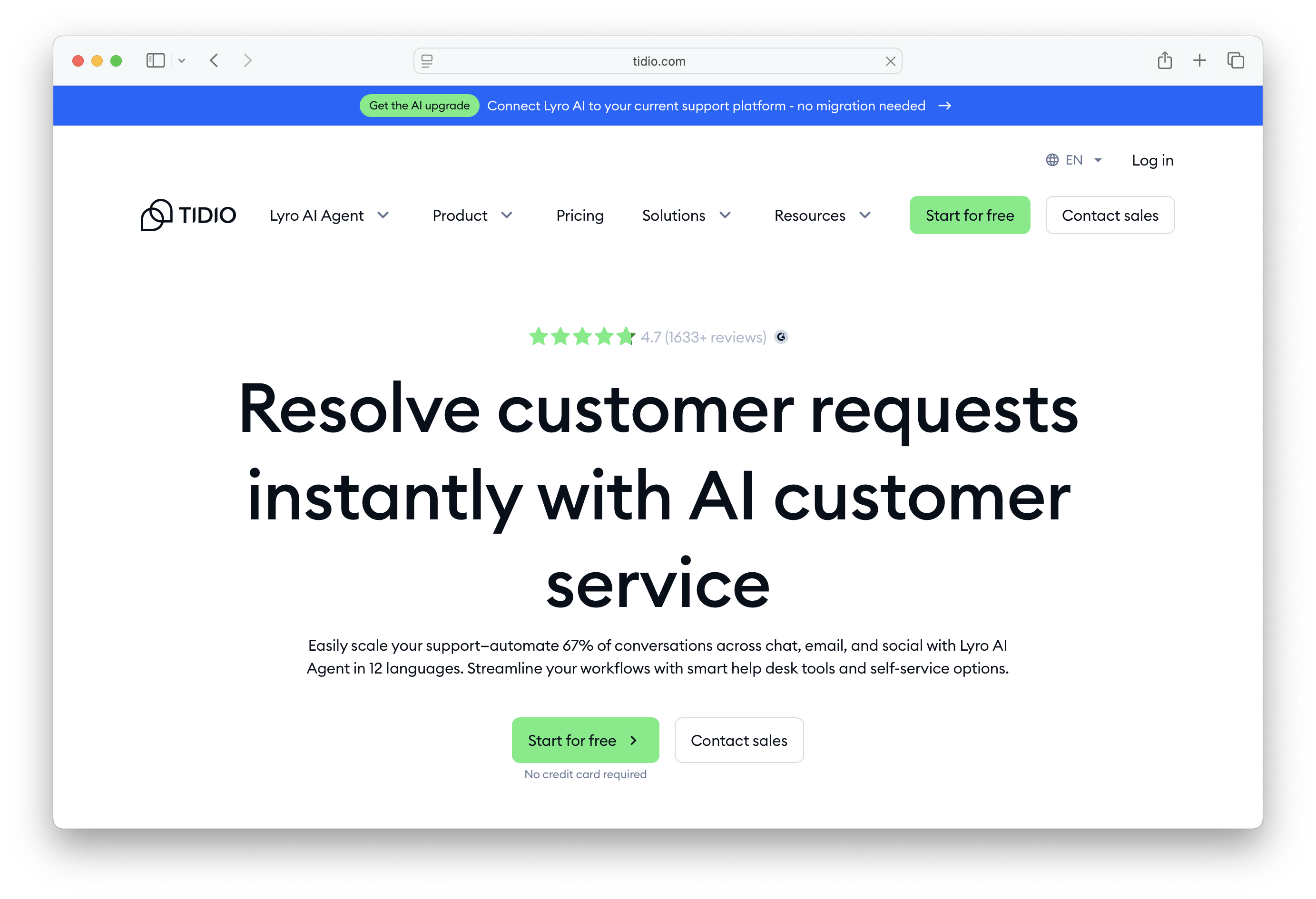
Website: https://www.tidio.com/
Key features:
- Fast and easy setup, ideal for small and medium businesses
- Customisable website chat widget paired with an omnichannel inbox
- Automatically tags conversations, serves up FAQ answers, and speeds up agent replies
✅ Pros:
- Quick setup
- Works out of the box with Shopify
- Affordable
❌ Cons:
- Limited custom logic
- Not a full-service AI agent
Best for: small DTC brands needing instant setup
10. Zoho Desk’s Zia
Zia is Zoho Desk’s AI assistant. It suggests replies and tags tickets, helping agents work faster, but it doesn’t autonomously resolve cases. For this reason, Zia is better suited for improving agent efficiency rather than full automation.
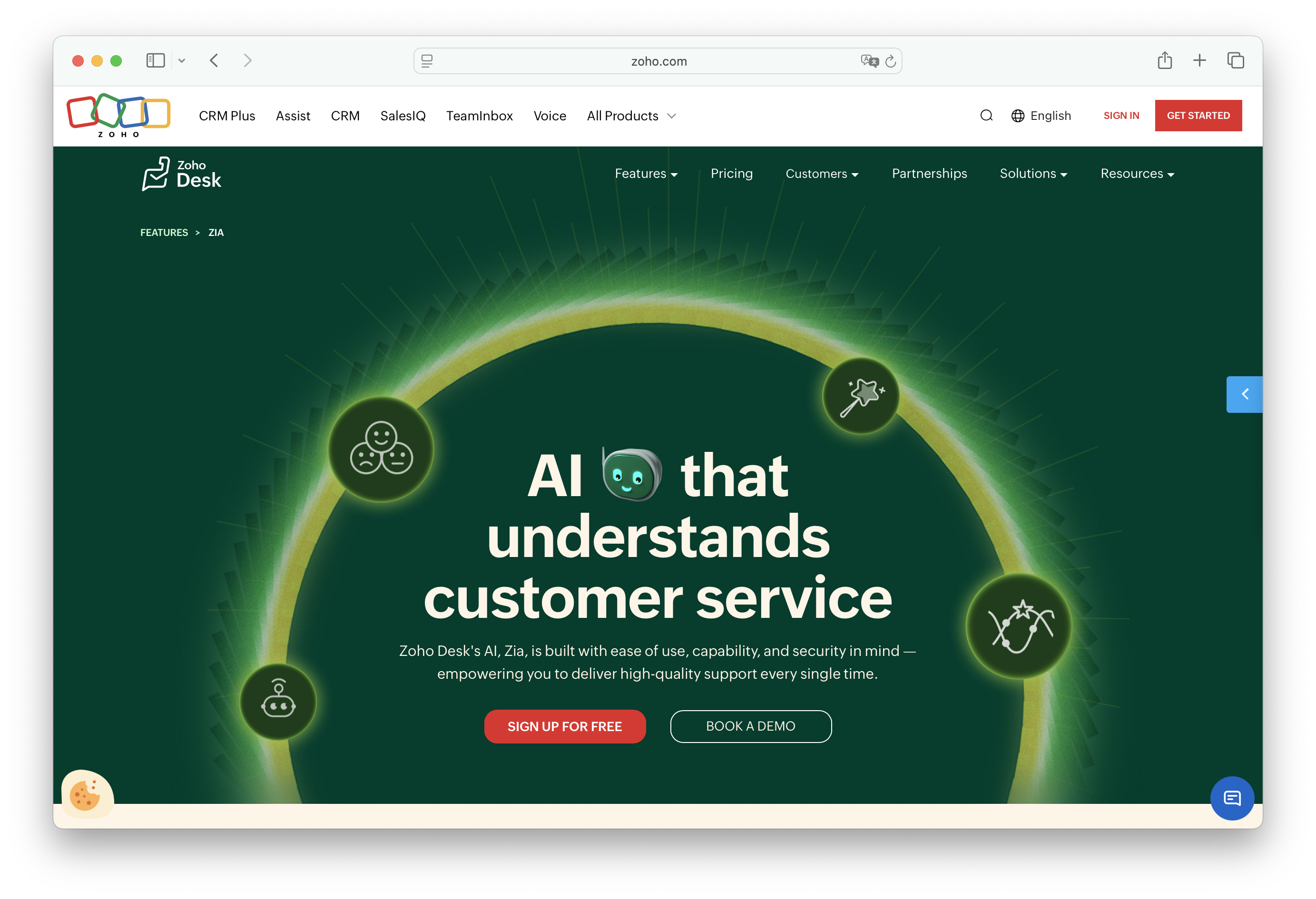
Website: https://www.zoho.com/desk/zia.html
Key features:
- Easily integrate ChatGPT into Zoho Desk using your OpenAI API key
- Guided Conversations: a low-code self-service chatbot to steer customer interactions
- Automatic tagging of incoming requests, making it simple for agents to find related tickets
- Flexibility for agents to edit or customise responses as needed
✅ Pros:
- Included with Zoho Desk
- Helpful for agent productivity
❌ Cons:
- No autonomous resolution capabilities
- Limited backend integration
Best for: budget-conscious support teams
What to look for in an AI support agent
Choosing the right AI agent goes beyond pricing or ease of setup. Here’s what to prioritise:
- Full-conversation handling: Can resolve entire support issues, not just reply with articles or FAQ snippets.
- Integrates with internal systems: Pulls data from orders, CRM, shipping, and inventory to act like a real team member.
- Context retention: Understands and remembers multi-turn dialogues to resolve issues naturally.
- Uses reasoning logic: Follows your business rules to decide when to refund, escalate, or resolve.
- Agent assist mode: Supports your team with suggestions, summaries, or notes during interactions.
- Autonomous multichannel support: Handles support across email, chat, and social platforms consistently.
- Smart human handoff: Escalates complex cases to human agents when needed.
- Performance reporting: Provides clear data on resolution rates, CSAT, deflection, and time savings.
Engaige: The AI agent built for full resolution, not just automated replies
Most AI tools in customer service platforms are just that: features. They help agents or handle simple tickets but don’t actually resolve issues.
Engaige is different.
It’s a full AI agent that integrates with your systems, understands your policies, and acts like a real team member. It doesn’t just reply. It resolves.
With Engaige, you can automate 40-80% of tickets, without losing control or compromising on CX. If you’re stuck with generic AI bots, it’s time for an AI agent that’s trained to work the way you do. Meet your AI agent, today.
FAQs about using AI agents for customer service
Which AI customer service solutions can scale to support millions of monthly customer interactions?
Platforms like Engaige, Ada, and Forethought can handle large-scale volumes. Engaige is built for e-commerce, making it ideal for brands juggling high ticket loads.
How does AI in customer service help sales numbers?
Faster responses = happier customers. AI agents reduce cart abandonment and keep buyers engaged, which translates into higher conversions.
What are the pros and cons of using AI in customer service?
Pros: Lower workload, faster responses, improved CX, cost savings.
Cons: Poorly trained AI can frustrate customers or miss context.
How can AI agents improve customer service?
AI agents deliver quick, consistent support 24/7, while freeing human agents to handle high-value cases.
How do AI customer service solutions integrate with CRMs?
Engaige and others connect via APIs or native integrations, pulling and updating customer data as needed.
How do you measure ROI from AI automation in customer service?
Track resolution rates, CSAT, ticket deflection, and cost per ticket. Engaige users typically see significant ROI from reduced manual workload and happier customers.
Lower your cost per resolution with AI customer service automation
Further reading
Continue learning with these resources about AI customer service automation.







.webp)

